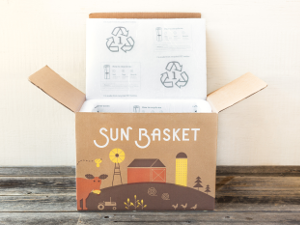It’s a tough time for meal kit delivery services. The popular service Blue Apron launched its IPO last year, falling short of initial expectations. The stock has struggled ever since, causing investors to question the viability of the industry as a whole.
But newcomer Sun Basket has managed to raise $57.8 million in funding in January despite the odds, and despite the fact that it’s not yet profitable.
According to Fast Company Magazine, Silicon Valley venture firm August Capital led the funding round and values Sun Basket at more than $500 million. Sun Basket saw revenue quadruple in 2017, with annual revenue totaling roughly $275 million. While other meal kit industries have continued to grow revenues, none have managed to get such a nod of confidence from investors.
Sun Basket is different in this way: it’s the only meal kit industry to offer meals that appeal to people with special diets and food allergies, including Paleo, vegan, dairy-free, gluten-free, soy-free, Mediterranean, and pescatarian. Since so many people have allergies and other food sensitivities, this makes ordering a meal kit much more appealing. On top of this, Sun Basket delivers sustainable and organic ingredients, along with 100% recyclable and compostable packaging.
Investors see the ability to capitalize on Sun Basket’s “clean eating” premise, according to Fast Company. By offering meal kits to people with special dietary needs, they are creating a clean eating brand that can partner with companies and products that also promote wellness. For instance, a juice company could partner with Sun Basket to offer breakfast juicing kits, attracting new customers.
Originally, meal kit services were positioned to upend the grocery industry. So far, this hasn’t happened, but an unexpected player did influence the market. Last summer, weeks before Blue Apron launched its IPO, Amazon announced its acquisition of Whole Foods and began offering its own limited line of meal kit services. These moves caused a disruption not only to Blue Apron’s stock value, but to the industry as a whole.
As investors have watched Blue Apron’s stock decline over the last few months, many have shied away from investing in meal kit service companies, so it was difficult for Sun Basket to obtain more funding. But the company was also attractive to investors because their customers tend to stick around and spend more. (According to analytics firm Cardlytics, half of all meal kit consumers cancel their subscriptions after six months or less, and two-thirds do so within a year.)
Sun Basket has managed to obtain the confidence of investors in a risky new industry, so it will be interesting to see where they’re headed.
